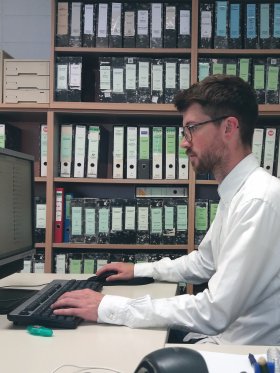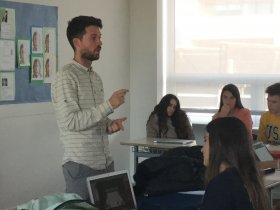Gerard Baquer Gómez


PhD Programme: Technologies for Nanosystems, Bioengineering and Energy
Research group: SIPOMICS - Signal Processing for Omic Sciences
Supervisors: Pere Ràfols Soler & Xavier Correig Blanchar
Bio
During his BSc in Electronics Engineering at URV and MSc in Electrical Engineering at TU Delft, Gerard Baquer developed a strong research-oriented profile based on three core pillars: Artificial Intelligence, Biomedical Engineering and Electronic Instrumentation. He conducted his Bachelor Final Project “Fuzzy ARTMAP package in R” under the supervision of Dr Brezmes. Later, at the Intelligent Systems Group at TU Delft he took part in the study “Predicting the Pathogenicity of Single Point Mutations with Convolutional Neural Networks”. The goal was to use Convolutional Neural Networks to determine the pathogenicity of Single Point Mutations in DNA. Finally, he worked under the supervision of Dr. Serdijn (Bioelectronics TU Delft) and Dr. Blok (Urology Erasmus MC Rotterdam) on his MSc Thesis “Optimal stimulation waveform for efficacious high-frequency block of the pudendal nerve with minimized electrochemical damage”. The results show that non-standard waveforms with a slight charge imbalance lead to electrochemically safer stimulation. His academic profile has been strongly complemented by his professional experience. During his BSc studies Gerard did several internships abroad in the field of software development. Upon completion of the BSc studies he worked for a year as an instrumentation and control Engineer at IDOM. During the first year of his MSc studies he worked as an Electrical Engineer for Project MARCH in the development of an exoskeleton that allows paraplegic users to walk. He has also experience as a teaching assistant in several Bachelor and Master courses at TU Delft.
Project: Computational tools for the annotation of in-source fragments and matrix-related signals in MALDI Mass Spectrometry Imaging
Personalized medicine has been touted as the future of healthcare. Individualized treatments are required for different patients according to their different traits. "Omics" sciences are one of the areas were more researchers are trying to find the information to make this vision true. Inside the “Omics” term, Genomics, Transcriptomics, Proteomics and Metabolomics are the main branches of this philosophy. Although all four branches of research are important, probably the latest to join the group is the one that has more options to become a mainstream area of research and innovation. The reason for this is three-way: First, while Genomics can tell you what might happen due to your genotype, metabolomics tells you what is actually happening knowing your phenotype. Secondly, metabolomics is the result of intrinsic genotypes but also is greatly affected by external factors which, of course, are also taken. Finally, since external factors affect the metabolome, more actions can be taken to improve the overall health of a patient. Nowadays, technical advances have generated a large amount of measurement techniques that can be used to detect, identify and quantify metabolites (small molecules present mainly in biofluids or tissues of living entities like humans). One common characteristic of these systems is the wealth of raw data they generate for each measurement. Converting this raw data into useful metabolomic and clinical information is key to find exciting new applications of these techniques towards the Personalized Medicine envisaged for the 21st century. The goal of the project is to devise algorithms in the fields of biostatistics, digital signal processing, pattern recognition, multivariate analysis and neural networks to be able to process raw data coming from the measuring of biofluids such as serum, plasma or urine with different stablished techniques like NMR, Gas/liquid Chromatography-MS and MALDI-TOF to add relevant clinical information to the metabolomics field. All these algorithms will be developed in open platforms such as R, the gold standard for statistical analysis in biosciences, and will be validated with real samples and real problems that have not been solved until now. The project is involved with the Ciberdem institute that can provide all the samples and cases to study and the Institut Pere i Virgili de recerca. Metabolomics and the techniques that provide the information needed have a bright future in medicine, since the information obtained can be used for early diagnosis through the discovery of robust and significant biomarkers or to assess the efficacy of new treatments. All this work could be included in a new profile of researchers commonly known as "data scientists".
Open Access publications
- Baquer, G., Sementé, L., García-Altares, M. et al. rMSIcleanup: an open-source tool for matrix-related peak annotation in mass spectrometry imaging and its application to silver-assisted laser desorption/ionization. J Cheminform 12, 45 (2020). View full-text
- Lluc Sementé, Gerard Baquer, María García-Altares, Xavier Correig-Blanchar, Pere Ràfols, rMSIannotation: A peak annotation tool for mass spectrometry imaging based on the analysis of isotopic intensity ratios, Analytica Chimica Acta, Volume 1171, 2021, 338669. View full-text
- PHD THESIS: Computational tools for the annotation of in-source fragments and matrix-related signals in MALDI Mass Spectrometry Imaging
Outreach activities
- Science Week 2019: “Simulating Natural Selection”.
- European Researchers’ Night 2019: “Simulem la selecció natural”.
International secondment
- Brigham and Women's Hospital, Harvard University, USA. 6 months (2021-2022).
News
- Diari Digital de la URV. News: Disarming the body's defenders




